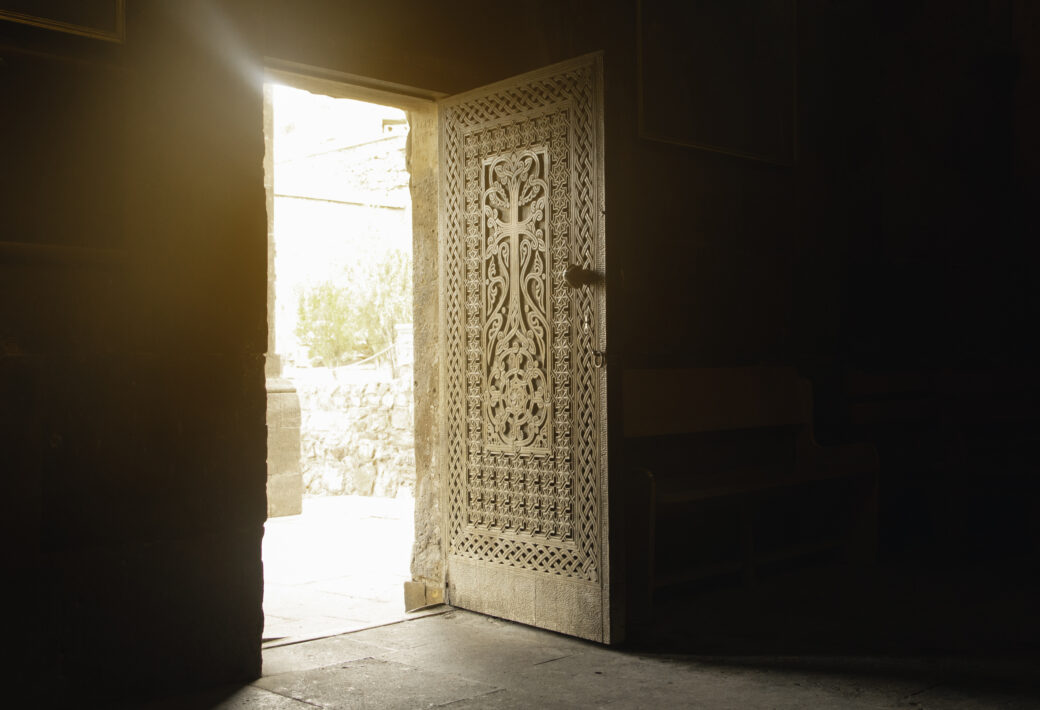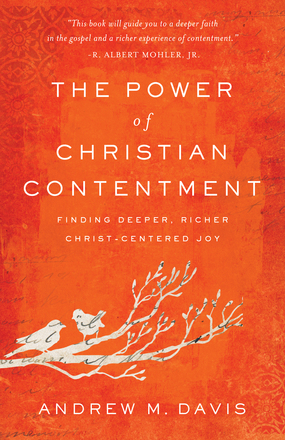
Starting from Philippians 4, this class discusses that Christian contentment can be learned by experience and grace.
These are only preliminary, unedited outlines and may differ from Andy’s final message.
Philippians 4:12-13 I know what it is to be in need, and I know what it is to have plenty. I have learned the secret of being content in any and every situation, whether well fed or hungry, whether living in plenty or in want. I can do everything through him who gives me strength.
I. The Nature of Christian Contentment: What It Is
II. The Art and Mystery of Christian Contentment
III. What Lessons Must Be Learned to Achieve Christian Contentment IV. The Glories and Excellence of Christian Contentment
Doctrine: To be well-skilled in the mystery of Christian contentment is the duty, glory, and excellence of a Christian.
I. Christian Contentment Described
Definition: Christian contentment is that sweet, inward, quiet, gracious frame of spirit, which freely submits to and delights in God’s wise and fatherly disposal in every condition. II. The Mystery of Contentment
“But you will object: What you speak of is very good, if we could attain to it; but is it possible for anyone to attain to this? It is possible if you get skill in the art of it; you may attain to it and it will prove to be not such a difficult thing either, if you but understand the mystery of it….
There is a great mystery and art in what way a Christian comes to contentment.”
A. A Christian is content, yet unsatisfied
“A man who has learned the art of contentment is the most contented with any low condition that he has in the world, and yet he cannot be satisfied with the enjoyment of all the world. He is contented if he has but a crust, but bread and water… yet if God should give unto him Kingdoms and Empires, all the world to rule… he would not be satisfied with that.”
Matthew 16:26 For what will it profit a man if he gains the whole world and forfeits his soul? Or what shall a man give in return for his soul?
Jesus makes it plain that our souls are worth more than all the material possessions of the world… and God is worth more than that! So we know that our eternal inheritance has to be vastly greater than the world’s delights.
“Here is the mystery of it: though he heart is so enlarged that the enjoyment of all the world and ten thousand worlds cannot satisfy him for his portion; yet he has a heart quieted under God’s disposal if he gives him but bread and water.”
There is a vast difference between a Christian’s passage and his portion: “A little in the world will content a Christian for his passage, but all the world, and ten thousand times more will not content a Christian for his portion.”
“A soul that is capable of God can be filled with nothing else but God.”
Philippians 3:8-9 What is more, I consider everything a loss compared to the surpassing greatness of knowing Christ Jesus my Lord, for whose sake I have lost all things. I consider them rubbish, that I may gain Christ and be found in him, not having a righteousness of my own that comes from the law, but that which is through faith in Christ– the righteousness that comes from God and is by faith.
Psalm 73:25 Whom have I in heaven but you? And earth has nothing I desire besides you.
We go through the world LONGING and YEARNING for heaven… discontent in one sense because we have not yet arrived… but content that we will someday at last come into our eternal inheritance.
In Pilgrim’s Progress, Bunyan speaks of “Beulah Land” where Christian and Hopeful were struck with a longing for heaven that overwhelmed them:
Now, as they walked in this land, they had more rejoicing than in parts more remote from the Kingdom to which they were bound; and drawing near to the City, they had yet a more perfect view thereof. It was built of pearls and precious stones, also the street thereof was paved with gold; so that, by reason of the natural glory of the City, and the reflection of the sunbeams upon it, Christian, with desire, fell sick; Hopeful also had a fit or two of the same disease; wherefore, here they lay by it awhile, crying out, because of their pangs, “If you see my Beloved, tell him that I am sick of love.”
But being a little strengthened, and better able to bear their sickness, they walked on their way, and came yet nearer and nearer; where were orchards, vineyards, and gardens, and their gates opened into the highway. Now, as they came up to these places, behold the gardener stood in the way, to whom the pilgrims said, “Whose goodly vineyards and gardens are these?” He answered, “They are the King’s; and are planted here for his own delights, and also for the solace of pilgrims.” So the gardener had them into the vineyards, and bid them refresh themselves with dainties. He also showed them there the King’s walks, and the arbours where he delighted to be: and here they tarried and slept.
Q: Why does an increased heavenly-mindedness, and even a heavenly yearning lead to greater Christtian contentment?
B. He comes to contentment by subtraction
“Not so much by adding to what he would have, or to what he has, not by adding more to his condition; but rather by subtracting from his desires, so as to make his desires and his circumstances even and equal.”
“A carnal heart knows no way to be contented but this: I have such and such possessions, and if I had this added to them, and the other comfort added that I have not now, then I should be contented…. The world is infinitely deceived in thinking that contentment lies in having more than we already have.”
“The way to be rich is not by increasing wealth, but by diminishing our desires. Certainly that man or woman is rich, who have their desires satisfied.”
Q: How do we do this? How do we SUBTRACT desires from our hearts?
C. By adding another burden to himself
“The world thinks the way to contentment in affliction is to be rid of your burdens (i.e. to have the affliction removed). No…the way to contentment is to add another burden (beyond your present difficult circumstances), that is, to labor to load and burden your heart with your sin; the heavier the burden of your sin is to your heart, the lighter will become your affliction to your heart, and so you shall be content.”
Example: “It Is Well With My Soul”
In the 1870s Horatio Spafford was a successful Chicago lawyer and a close friend of evangelist Dwight L. Moody. Spafford had invested heavily in real estate, but the Chicago fire of 1871 wiped out his holdings. His son had died shortly before the disaster. Spafford and his family desperately needed a rest so in 1873 he planned a trip to Europe with his wife and four daughters. While in Great Britain he also hoped to help Moody and Sankey with their evangelistic tour. Last minute business caused Spafford to delay his departure, but he sent his wife and four daughters on the S.S. Ville Du Havre as scheduled, promising to follow in a few days. On November 22 the ship was struck by the English ship Lochearn, and it sank in twelve minutes. Several days later the survivors landed at Cardiff, Wales, and Mrs. Spafford cabled her husband the brief message, “Saved alone.”
When Horatio Spafford made the ocean crossing to meet his grieving wife, he sailed near the place where his four daughters had sunk to the ocean depths. There, in the midst of his sorrow, he wrote these unforgettable words that have brought solace to so many in grief:
When peace, like a river, attendeth my way,
When sorrows like sea billows roll,
Whatever my lot, Thou hast taught me to say, It is well, it is well, with my soul.
Note the third verse:
My sin, O the bliss of this glorious thought!
My sin—not the part but the whole—
Is nailed to the cross and I bear it no more!
Praise the Lord! Praise the Lord, O my soul!
It may seem strange to bring up sin to such a deeply grieving soul… but the Holy Spirit is bold to do it, because true health comes from contemplating how great was our debt and how
much SIN STILL AFFLICTS OUR SOULS! We still must have a saving work done within our deeply divided hearts. So we should labor to see God’s wise and loving work in reference to our sins, past, present, and future.
And “kiss the rod” as Sarah Edwards did.
Q: Why would this theme be particularly difficult to bring up to a grieving person? By why would all afflicted people do well to bring this up to themselves? And how could we prepare ourselves ahead of time to benefit from this approach?
Burroughs gives excellent advice to a suffering married couple:
Many times in a family, when any affliction befalls them, Oh, what an amount of discontent is there between man and wife! If they are crossed in their possessions at land, or have bad news from across the seas, or if those whom they trusted are ruined and the like, or perhaps something in the family causes strife between man and wife, in reference to the children or servants, and there is nothing but quarrelling and discontent among them, now they are many times burdened with their own discontent; and perhaps will say one to another, It is very uncomfortable for us to live so discontented as we do. But have you ever tried this way, husband and wife? Have you ever got alone and said, ‘Come, Oh let us go and humble our souls before God together, let us go into our chamber and humble our souls before God for our sin, by which we have abused those mercies that God has taken away from us, and we have provoked God against us. Oh let us charge ourselves with our sin, and be humbled before the Lord together.’? Have you tried such a way as this? Oh you would find that the cloud would be taken away, and the sun would shine in upon you, and you would have a great deal more contentment than ever you had.
Q: How could such an approach help a married couple that is struggling with sharp trials and bitter discontentment?
D. By changing the affliction into something else
You make the affliction a positive good rather than a negative evil… a wise stroke from a master craftsman on your soul
Luther: “A Christian becomes a mighty worker and a wonderful creator, to create out of heaviness, joy; out of terror, comfort; out of sin, righteousness; out of death, life.”
“Two men may have the same affliction; to one it shall be as gall and wormwood, yet it shall be wine and honey and delightfulness and joy and advantage and riches to the other.”
Meditating on sound doctrine, especially in light of the cross and the empty tomb, can transform even the bitterest circumstances to something entirely beneficial. The “sting” can be removed!
1 Corinthians 15:55 “Where, O death, is your victory? Where, O death, is your sting?” E. By doing the work of his circumstances
“A Christian thinks, ‘Well, how shall I come to be satisfied and content?… What is the duty of the circumstances God has put me into?”
“You should labor to bring your heart to quiet and contentment by setting your souls to work in the duties of your present condition.”
God has done this for a purpose… ask “What duties are required of this condition? How can I make the most of this situation for the glory of God and His Kingdom?
Paul uses this striking phrase about King David:
Acts 13:36 “For when David had served God’s purpose in his own generation, he fell asleep
A contented Christian always asks, “For what purpose has God brought me into this situation? What duties is he laying on me here?”
On the one hand: prosperity!! A Christian should ask, “Why has God given me such a generous share of earthly wealth and health and strength? Merely for my personal enjoyment, or to advance Christ’s Kingdom in the world?”
Randy Alcorn: “God gives us increased wealth not merely to improve our standard of living, but rather our standard of giving.”
2 Corinthians 8:15 as it is written: “He who gathered much did not have too much, and he who gathered little did not have too little.”
Q: How would such a view of prosperity cause us to be free from discontent that usually goes with wealth (like lottery winners, who later have to declare bankruptcy or get addicted to drugs or commit suicide)?
Q: On the other hand, how would such an approach (asking God, “What are my duties in this situation?”) help someone who has just received a diagnosis of cancer maintain Christian contentment? [Like, what would such a man’s duties be to his wife, or to his watching family, or to friends who interact with him during his trial?]
F. By melting his will into God’s will
“It is not by having his own desires satisfied, but by melting his will and desires into God’s will. So that, in one sense he comes to have his desires satisfied though he does not obtain the thing he desired before; still he comes to be satisfied with this, because he makes his will to be at one with God’s will.”
Psalm 37:4 Delight yourself in the LORD and he will give you the desires of your heart.
Try: “Delight yourself in the Lord, and He will assign you the desires of your heart.”
Or better: “Delight yourself in the Lord, and His desires will become your desires.” Or even better: “Delight yourself in the Lord, and He will become your desire.” Psalm 47:4 He chooses our inheritance for us, The glory of Jacob whom He loves.
Q: How can we learn to have our wills melt into God’s will?
Q: How does Jesus give us an example in his prayer in Gethsemane: “Not my will, but yours be done”?
G. By purging out what is within
James 4:1 What causes fights and quarrels among you? Don’t they come from your desires that battle within you?
Discontentment is caused by evil desires (lusts) that battle within our hearts; unless such evil thoughts are purged out, we can never be content
These ambitions, and desires, and bitter thoughts, and false intentions, and carnal passions conspire to make life utterly miserable for us… we must have them out.
Actually, each circumstance we face is an opportunity for us to see these evil desires weaken more and more. The more we refuse to yield to the actions that the desires want to see us do, the weaker such passions will be within our hearts.
ESV Romans 6:6 We know that our old self was crucified with him in order that the body of sin might be brought to nothing, so that we would no longer be enslaved to sin.
Death by starvation! Don’t feed the complaining spirit by complaining.
H. Living on the dew of God’s blessing
Burroughs: “A grasshopper leaps and skips up and down and lives on the dew. A grasshopper does not live on the grass as other things do; you do not know what it feeds on…. In the same way, a Christian can get food that the world does not know of; he is fed in a secret way by the dew of the blessing of God.”
In other words, Christians find a secret source of inner joy in seeing God’s smaller blessings throughout the day, even while suffering greatly. They see in smaller blessings evidence of God’s ongoing grace and care for them while they suffer bitter afflictions. These secret moments of blessing are what Burroughs calls “the dew of God’s blessing”.
We Christians realize that
James 1:17 Every good and perfect gift is from above, coming down from the Father of the heavenly lights, who does not change like shifting shadows.
Also all of God’s gifts are “blood-bought” by Christ, so they are even sweeter!
Q: How can a Christian learn to be content with an array of smaller blessings even while suffering greatly in other areas? Is this realistic? If so, how do we put it into practice?
I. Seeing God’s love in afflictions
Burroughs: “All of God’s strokes are strokes of love and mercy…. Grace gives a man an eye to pierce into the secret counsels of God, those eternal counsels of God for good for him, even in his afflictions; he can see the love of God in every affliction as well as in prosperity.”
Romans 8:28-29 And we know that God causes all things to work together for the good of those who love him, who have been called according to his purpose. 29 For those God foreknew he also predestined to be conformed to the likeness of his Son, that he might be the firstborn among many brothers.
God’s actions in causing all things to work together for the good of the elect is in service to his overall PURPOSE… to conform us to the image of his Son. That conforming will not take place without a wise mixture of bitter suffering and sweet blessings. God alone knows what mixture to use. So we Christians can be content in any and every situation because we know that ALL OF THEM are wisely mixed together by our loving heavenly Father to the end of our final conformity to Christ in heaven!
Q: We know these things are true… but it is so easy to forget! How can we remind ourselves of the truth of Romans 8:28-29 when we are hurting the most?
Q: How can we help other Christians who are suffering to embrace these truths? It is hard to find the right time and the right ways to say Romans 8 to someone… what advice would you give on how to do it?
J. Afflictions Sanctified by Christ
The concept is this: take all of your circumstances, especially your afflictions, and compare them back to those of Christ. Jesus purifies these afflictions and makes them holy medicine for us, especially by reminding us of his own afflictions.
Do we have poverty? Jesus had more!
Matthew 8:20 Jesus replied, “Foxes have holes and birds of the air have nests, but the Son of Man has no place to lay his head.”
Do we have disgrace or dishonor? Jesus had more!
Isaiah 53:3 He was despised and rejected by men, a man of sorrows, and familiar with suffering. Like one from whom men hide their faces he was despised, and we esteemed him not.
Matthew 26:67 Then they spit in his face and struck him with their fists. Others slapped him
John 18:40 They shouted back, “No, not him! Give us Barabbas!” Do we have great fears? Jesus had more!
Mark 14:36 “Abba, Father,” he said, “everything is possible for you. Take this cup from me. Yet not what I will, but what you will.”
Luke 22:44 And being in an agony he prayed more earnestly; and his sweat became like great drops of blood falling down to the ground.
Do we have great bodily pain? Jesus had more!
Isaiah 52:14 Just as there were many who were appalled at him–his appearance was so disfigured beyond that of any man and his form marred beyond human likeness Do we have great emotional and psychological pain? Jesus had more!
Matthew 27:46 About the ninth hour Jesus cried out in a loud voice, “Eloi, Eloi, lama sabachthani?”– which means, “My God, my God, why have you forsaken me?”
Q: How can meditation on Christ’s sufferings for us help us be content in any and every situation?
Q: How does it help us to realize Jesus is actually crafting these afflictions to help form his own character in us?
K. Getting strength from Christ
Philippians 4:13 I can do everything through him who gives me strength.
Burroughs: “A Christian finds satisfaction in every circumstance by getting strength from another, by going out of himself to Jesus Christ, by his faith acting upon Christ, and bringing the strength of Jesus Christ into his own soul, he is thereby enabled to bear whatever God lays on him, by the strength that he finds from Jesus Christ.”
2 Timothy 4:16-17 At my first defense, no one came to my support, but everyone deserted me. May it not be held against them. 17 But the Lord stood at my side and gave me strength, so that through me the message might be fully proclaimed and all the Gentiles might hear it.








